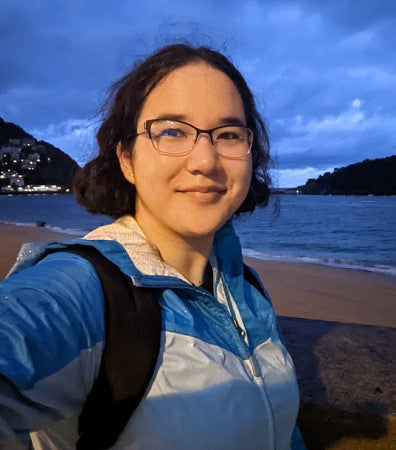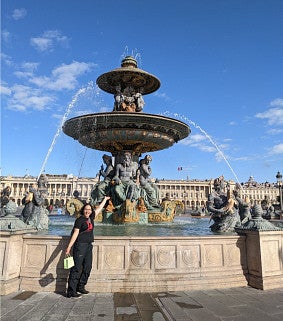Language, culture and travel are all important aspects in the life of this CHC junior.

Song on repeat: “The Lost Battalion” by Sabaton. My CrossFit coach used to play niche artists and my favorite genre was historical heavy metal.
Coffee or tea: Rose tea. I’m a tea person. I just don’t like coffee.
Role model: It’s not a single person. I like finding people my age who are doing things.
Favorite study spot: I like the energy of people sitting in libraries.
Emma Koontz has always had an affinity for exploring, something that played out routinely for the Clark Honors College junior last fall term as she participated in a study abroad program in Segovia, Spain.
Once, she found herself wandering through the Valencia Cathedral with a friend. They found themselves in a random room that seemed ordinary until a chalice in a glass case caught their attention. They didn’t realize until the words from an audio guide explained that the chalice was, in fact, considered to be the Holy Grail.
Her friend turned to her and said with amazement, “Yo, I didn’t think I’d find the Holy Grail today.”
Koontz remembers thinking at the time that her Spanish language skills put her in that position and many other positive experiences as she traveled across 19 cities in Europe last fall. “I’ve always had an affinity for things you don’t think to question that when you question them you realize how much they shape you,” says Koontz. “A lot of things you can't just see. You have to talk to people and have conversations about navigating things.”
At CHC, Koontz is majoring in Planning, Public Policy and Management. And a significant part of her academic experience is focused on nurturing her Spanish and Korean language skills. She sees herself traveling the world, connecting with others and linking to her Korean roots. Her time in Segovia included living with a host family and discovering that her foreign language skills opened doors.
As a teen, Koontz decided to focus on Spanish because it’s the second-most widely spoken language globally. She nurtured her passion for Spanish outside of school by co-writing a children’s book as part of an independent study project.
In high school, Koontz helped start a debate team and relished her time there that helped build her confidence. She says it also exposed her to racism and sexism as a young woman of color. She remembers how some of the debate judges would explain her loss to a fellow white male debater: “He seemed more authoritative,” the judges would say.
“Theoretically, debate is a completely neutral and equal environment. It’s based on your merits and how hard you work to put together an argument,” says Koontz. “But, sometimes the facts don’t matter. At times, they’re judging off of things like whether you wear a skirt or not.”
Those experiences helped her grow, and when she arrived at UO she jumped at the chance to learn more about the dynamics of power and opportunity. She took Ulrick Casimir’s CHC class “Narratives of Retribution and Revenge” and says an experience of watching a South Korean movie about a woman who was framed for a murder she didn’t commit moved her in a way she didn’t quite understand. That feeling pushed her to conduct research on generational trauma. Koontz presented her work at UO’s Undergraduate Research Symposium and later had her paper published.
In Spain, Koontz spent a lot of time with her host mom so she could learn more about the country. She attended the La Merce festival in Barcelona – complete with giant puppets, human towers, and dancing strangers.

Koontz says she feels that other aspects of Spain’s history – architecture, art and language – should be reflected along with the profound effects of colonization.
Although she just finished unpacking from her adventures in Spain, there’s no stopping Koontz.
For Winter and Spring term, she will be studying at Seoul National University, but heading there she made a pit stop to visit her 84-year-old grandmother in Texas.
Koontz didn’t know Korean until she began learning it at the beginning of the pandemic a few years ago. For her, learning Korean allows her to connect with her grandmother in a way that she couldn’t in the past. “When I first started learning the language, I called my grandma who only speaks Korean,” says Koontz. “I only knew 100-level Korean so I didn’t understand everything she was saying, but finally being able to put the pieces together brought me to tears.”
During her time in Korea, Koontz plans on acquiring a sense of what she wants to do for her CHC thesis next year. She knows that immersing herself in the heart of South Korea will help her move forward in her studies, but also in exploring her identity. She is also excited to make new friends and visit family for the first time.
“Understanding where I am in a global society as a global citizen before going abroad, I sort of felt tethered to Korea, but not really anywhere else,” says Koontz. “I’m starting to see how existing in the U.S. has semiotic value and impacts other people abroad. I now ask myself: ‘What do I do with that now that I'm back?’”
—Story by Keyry Hernandez, Clark Honors College Communications
—Photos courtesy of Emma Koontz
